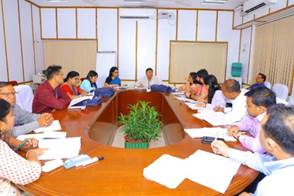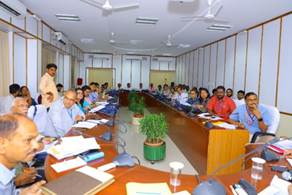Ministry of Panchayati Raj begins a two-day National Stakeholder Consultative Workshop on Panchayati Raj System
Ministry of Panchayati Raj began a two-day National Stakeholder Consultative Workshop on Panchayati Raj System: Retrospect & Prospects in close collaboration with National Institute of Rural Development & Panchayati Raj (NIRD&PR) at Vikas Auditorium, NIRD&PR in Hyderabad today to deliberate upon emerging and pressing issues of Panchayats and the roadmap / way ahead for enabling Panchayats as “Change Makers” or “Agents of Change”. Secretary, Ministry of Panchayati Raj, Shri Sunil Kumar inaugurated and presided over the inaugural session on the first day of National Stakeholder Consultative Workshop in the presence of Director General, NIRD&PR,Dr. G. Narendra Kumar, Additional Secretary, Ministry of Panchayati Raj, Dr. Chandra Shekhar Kumar, Joint Secretary, Ministry of Panchayati Raj, Shri Vikas Anand and Joint Secretary, Ministry of Panchayati Raj,Smt. Mamta Varma. The renowned stalwarts of Panchayati Raj system of India of olden times also graced the National Workshop with their august presence, prominent among them include former Secretary, Ministry of Rural Development, Dr. S. S. Meenakshisundaram; former Additional Chief Secretary to Government of West Bengal, Dr. Manabendra Nath Roy and former Secretary, Ministry of Panchayati Raj,Dr. S. M. Vijayanand.
The People’s Plan Campaign (PPC) 2023 for the preparation of the Panchayat Development Plans (2024–2025) was launched, and a Report on Formulation of Project Driven Block Panchayat and District Panchayat Development Plan prepared by the Committee constituted by the Ministry of Panchayati Raj and National Training Module of Panchayat Development Index was released on this occasion. A special issue of NIRD&PR’s Journal of Rural Development was also released in the context of completion of 30 Years of the 73rd Constitutional Amendment. A printed brochure on the School of Excellence in Panchayati Raj (SoEPR) at NIRD&PR to mark the initiation of foundation of SoEPR was released on this occasion.
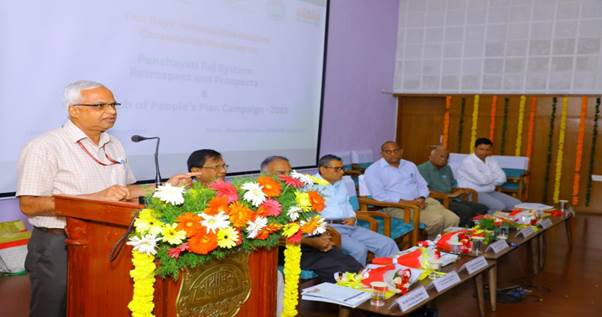
While addressing the participants of the National Stakeholder Consultative Workshop, Secretary, Ministry of Panchayati Raj, Shri Sunil Kumar advised them to take personal interest in promoting the cause of Panchayats so that the Panchayati Raj system all over the country is equivalent or even better than that of the pioneering States. The immediate areas where Panchayats should focus are those related to Panchayat Development Plans, Panchayat Development Index, Localization and Achievement of Sustainable Development Goals. He called upon Panchayats to be the catalysts of change to accelerate the pace of progress towards the achievement of the global goals in nine thematic areas identified for Panchayati Raj Institutions. Shri Sunil Kumar said that Ministry of Panchayati Raj is taking a leadership role in the process of Localization of Sustainable Development Goals (LSDGs) involving Central Ministries/Departments, State Governments, NITI Aayog and Panchayati Raj Institutions (PRIs) by evolving 9 thematic approaches to attain SDGs in rural areas. Panchayat Development Index (PDI) is a multi-dimensional assessment index which measures the progress of Panchayats towards the attainment of LSDGs, he added.
Shri Sunil Kumar said that as our Nation is committed to achieving SDGs by 2030, Baseline Report of the Panchayat Development Index (PDI) will definitely serve as a benchmark for the Ministry/Department in monitoring and evaluation of the progress made in achieving the concerned targets of the SDGs aligned to different flagship schemes/programmes and through Localized SDGs. Emphasizing the importance of teamwork, Shri Sunil Kumar mentioned that evidence-based planning at all levels and assessment of developmental progress through Panchayat Development Index (PDI) can be attained only through collective and collaborative efforts of the State Line Departments, Panchayati Raj Institutions and other stakeholders. Shri Sunil Kumar highlighted the importance of transformation of Rural Local Bodies and Traditional Local Bodies in preparation of holistic and high-quality Gram Panchayat Development Plan (GPDP) to address the aspiration of Gram Panchayat. He also emphasized that since the Panchayats are now aware of various grants of Central and State Governments, they should endeavour to plan a concrete GPDP which includes prioritized activities viz. water, health and sanitation, convergence of flagship schemes etc. He also underlined about role of Panchayati Raj Institutions in TB–Mukt Panchayat Abhiyan and highlighted the importance of convergence of Village Poverty Reduction Plan (VPRP) with the GPDP and the need of Self-Help Groups (SHGs) working together in tandem with Panchayati Raj Institutions (PRIs).
Shri Sunil Kumar emphasized on emergent need of meaningful and accountable Gram Sabhas, proper utilization of funds, raising own source revenues by Panchayats, use of innovation & technology, bridging the digital divide in rural and remote areas, convergence of all the resources available through all the Flagship Programmes under the ambit of Panchayati Raj Institutions and mainstreaming of Panchayat – Women Self Help Groups convergence for women empowerment and involvement of women in income generating activities. Shri Sunil Kumar said that our Gram Panchayats are the centre points of all activities in the grassroots democracy. There are more than 31.00 lakh elected representatives of Panchayats across the country in which almost 46% are women. And they can bring about tremendous transformational changes in rural areas. Panchayats have a significant role to play in effective and efficient implementation of flagship schemes for transformation of rural India. Keynote address delivered by Shri Kumar covered all the pertinent issues relating to functioning and strengthening of Panchayati Raj system in the country.
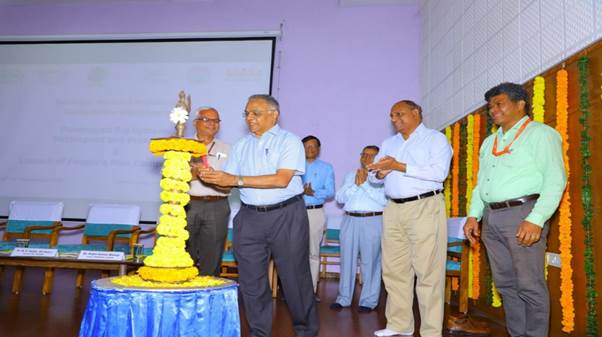
Addressing the participants through a presentation on setting up School of Excellence in Panchayati Raj (SoEPR), Director General, NIRD&PR, Dr. G. Narendra Kumar said that the establishment of the SoEPR at NIRD&PR will help in strengthening the Panchayati Raj system and to cater to their needs of knowledge on Panchayats and capacity to deliver the services to citizens more effectively. He added that with support from the MoPR, NIRD&PR has established a School of Excellence in Panchayati Raj (SoEPR) with nine new Centres in addition to the existing 21 Centres to delve into different domains of the Panchayati Raj system and to create a strong knowledge base for dissemination and application through the Panchayats across India.
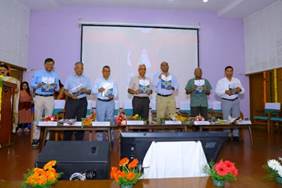
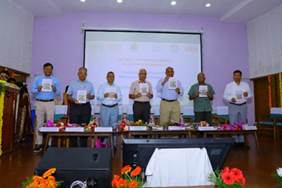
Setting the context for the National Workshop, Dr. Chandra Shekhar Kumar shared that now the aspirations and expectations of the rural people have been increasing and Panchayats are considered as drivers of rural transformation, and added that undoubtedly, Panchayats need to be equipped to emerge as drivers of rural transformation. He underscored that it is imperative to envision Capacity Building with a fresh ‘eco-system’ approach in core areas of Panchayats and emerging needs arising with the changing governance mechanism to attain holistic, inclusive and sustainable development of villages.
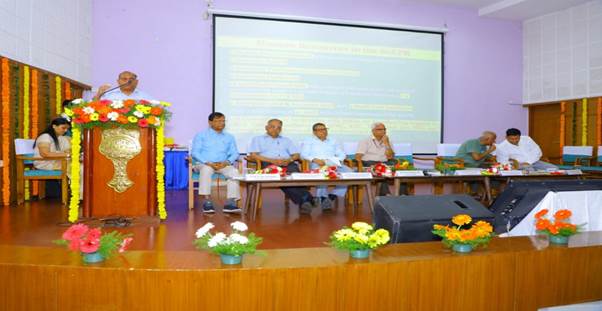
Dr. Chandra Shekhar Kumar said that the Ministry of Panchayati Raj is organizing this two-day National Stakeholder Consultative Workshop from 4th to 5th September 2023 to deliberate on the way ahead for enabling Panchayats as change makers. The objective of National Stakeholder Consultative Workshop is to discuss and deliberate on the six identified topics from the list of existing and emerging issues of Panchayats with all the major stakeholders.
Shri Vikas Anand made a detailed Presentation on People’s Plan Campaign–2023 and Road Ahead stating that Mantra of People’s Plan Campaign is Sabki Yojana Sabka Vikas and the initiative of Panchayat Development Plan (PDP) envisages formulation of well-thought-out Gram Panchayat Development Plan (GPDP) as well as Project-Driven Block Panchayat Development Plan (BPDP) and District Panchayat Development Plan (DPDP) which will pave the way for qualitative transformation and sustainable development in rural areas across the country. Dr. Anjan Kumar Bhanja, Associate Professor, NIRD&PR delivered welcome address at the National Workshop. After the inaugural session, the delegates proceeded to round table discussions on the objectives and deliverables of each of the Thematic Groups. The participants were formed into 6 Groups and 21 Sub-Groups to brainstorm on the 21 issues pertaining to the effective functioning of the Panchayati Raj system.
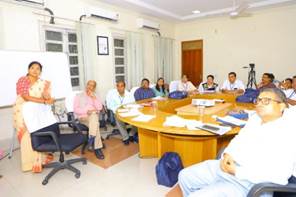
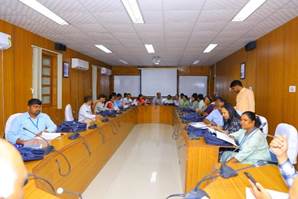
Secretaries, Joint Secretaries and Directors of Panchayati Raj Departments, Presidents and CEOs of District Panchayats, Presidents and Secretaries of Block Panchayat, Sarpanches of Gram Panchayats and Officials of State Institutes of Rural Development & Panchayati Raj from almost all States and Union Territories across the country are participating in the Workshop.
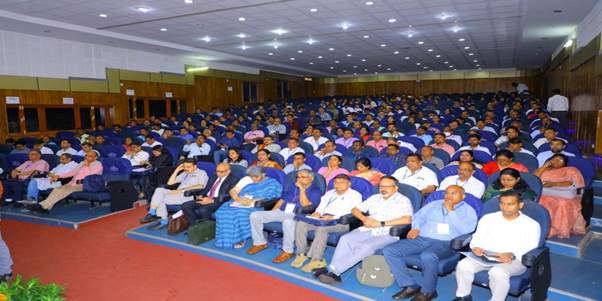
Representatives of majority of States/UTs from State/ UT Departments of Panchayati Raj, faculty–members of NIRD&PR, SIRD&PRs, Indian Institute of Public Administration (IIPA), Panchayati Raj Training Institutes, UN agencies, CBOs, NGOs are participating in the National Stakeholder Consultative Workshop. Elected representatives & functionaries of Panchayats from across the country, key stakeholders, domain experts and agencies doing commendable work in Panchayati Raj sector at grassroots level are participating in this National Workshop. Shri Ramit Maurya, Director, Ministry of Panchayati Raj and three Officers as Assistant Secretaries in the Ministry of Panchayati Raj Shri Om Prakash Gupta, Ms. Pallavi Verma and Shri Subhankar Bala are also attending the two-day National Stakeholder Consultative Workshop. Assistant Secretaries will bring the new and novel ideas on the table.
The six main topics of the brainstorming workshop are (i) Panchayat Election, (ii) Gram Sabha & Standing Committees and their Empowerment, (iii) Functioning of Panchayats, (iv) Panchayat Finances and Own Source of Revenue, (v) Leadership Role for Elected Women Representatives (EWRs), and (vi) Evidence–based Planning. The Workshop is expected to witness enriched discussions and deliberations on innovative approaches towards better planning, coordination and synergy among various stakeholders at Central, State/ UT, District, Block and Gram Panchayat levels for Empowered Panchayats, Sustainable Development.
The first day of the National Workshop witnessed an active and enthusiastic participation of the Panchayat representatives. The National Stakeholder Consultative Workshop will conclude tomorrow with Group Presentations on each of the identified themes and an open-house session for inviting ideas and suggestions for enhancing capabilities and efficiencies of Panchayats and carving a way forward towards achieving the stated goals in defined timeframe. The National Stakeholder Consultative Workshop is a unique opportunity for reevaluating and prioritizing the commitments and goals in a thoughtful manner and taking the preparedness for implementation of SDGs in rural areas to the next level. This Stakeholder Consultative Workshop is the first-of-its-kind endeavour to have focused discussion on identified emerging Panchayat issues.
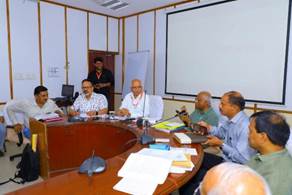
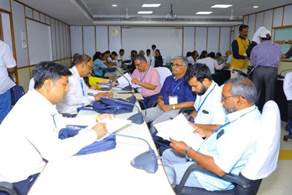
Participants opined that the National Workshop will show a right path for deepening democracy in Gram Panchayat areas, and appreciated the initiative of Ministry of Panchayati Raj and NIRD&PR stating that this National Workshop will help in preparing a roadmap for development through Panchayats in India. In the course of comprehensive deliberations during the Consultative Workshop, Panchayats were advised to develop and strengthen accountability mechanisms, and also involve SHGs/VOs and other institutions working with Panchayats in different Schemes to take forward the mandate of LSDGs in thematic areas with the active participation of all stakeholders. Here, intensive training and capacity building are also equally required, so that the measures coming out of such workshops can be institutionalized.
